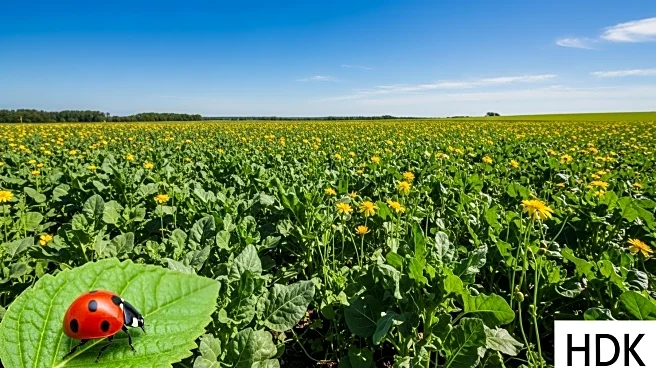What is the story about?
What's Happening?
Farmers across Europe are increasingly adopting integrated pest management (IPM) practices to reduce reliance on chemical pesticides. Supported by EU-funded research, these farmers are using eco-friendly methods such as crop rotation, pest-resistant varieties, and biological controls to protect crops. The initiative, known as IPMWORKS, aims to promote sustainable agriculture by minimizing pesticide use while maintaining crop health and profitability. Despite the benefits, adoption has been slow due to concerns about crop value and the need for financial incentives. The initiative has created farmer hubs to facilitate knowledge exchange and support the transition to IPM.
Why It's Important?
The shift towards integrated pest management represents a significant step in reducing the environmental and health impacts of chemical pesticides. By adopting IPM practices, farmers can contribute to cleaner water, healthier soils, and increased biodiversity. This approach not only benefits the environment but also offers economic advantages by reducing the costs associated with pesticide use. As concerns about pesticide-related pollution and health risks grow, IPM provides a viable alternative that aligns with sustainable agriculture goals. The initiative highlights the potential for widespread adoption of IPM to transform farming practices and enhance food security.
What's Next?
The success of IPMWORKS suggests that expanding IPM practices could lead to a substantial reduction in pesticide use across Europe. Efforts to scale up these practices will require addressing barriers such as financial incentives and changing farmer perceptions. Continued support from research initiatives and government policies will be crucial in facilitating this transition. As more farmers adopt IPM, the potential for positive environmental and economic impacts will increase, paving the way for a more sustainable agricultural future. The initiative's focus on peer-to-peer networks and farmer hubs will play a key role in driving this change.
Beyond the Headlines
The adoption of integrated pest management raises important considerations about the future of agriculture. While the benefits are clear, challenges such as ensuring widespread adoption and maintaining crop yields must be addressed. The initiative highlights the need for a holistic approach to farming that balances environmental, economic, and social factors. As IPM practices become more prevalent, they could lead to a fundamental shift in how agriculture is perceived and practiced, emphasizing the importance of working with nature rather than against it. This transformation could have long-term implications for food production and environmental conservation.
















